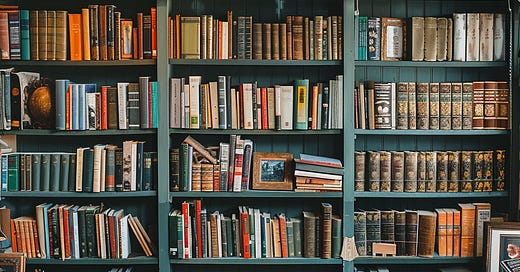Yonit’s Literary Escapes: Essential Reads for Tough Times
During a year when escaping reality was crucial, Yonit offers book recommendations that provide a much-needed breath of fresh air.
"In reading a novel, any novel, we have to know perfectly well that the whole thing is nonsense, and then, while reading, believe every word of it. Finally, when we're done with it, we may find – if it's a good novel—that we're a bit different from what we were before we read it, that we have changed a little, as if by having met a new face, crossed a street we never crossed before. But it's very hard to say just what we learned, how we changed."
(Ursula K. Le Guin, The Left Hand of Darkness)
In a year in which escaping reality was a necessity, books became a tool for survival. The list below is pure escapism: there's nothing here about the Middle East or about Israel (that all might appear in future lists); these are books one can dive into and breathe a different air, meet different people, and - to borrow an idea from Ms. Le Guin - to change a little without knowing how. All these books helped me through this terrible year. A mixed bag of fiction and non-fiction (and some science fiction):
A Swim in the Pond in the Rain: In Which Four Russians Give a Masterclass on Writing, Reading, and Life / George Saunders
My mother taught me Chekhov was the greatest writer of all (and Shakespeare, I want to be fair to her words), so naturally I would pick up a book "In Which Four Russians Give a Masterclass on Writing, Reading, and Life." This originated from Saunders' class on the 19th century Russian short story and it is a magical read, a tour of Chekhov and Turgenev, Tolstoy and Gogol. I am not a fan of audio books – but this has an extra zing to it when you listen (Glenn Close reads Chekhov- what's not to like?)
Philadelphia Story / Philip Barry
The theatre nerd in me loves reading plays, not only seeing them on stage - and this is one of the best plays of the 20th century, by the genius that was Philip Barry. (I always think of him as the Aaron Sorkin of the 30's- I hope I'm doing them both justice by this comparison). The thought that Katherine Hepburn was wise enough to purchase the rights to the play she stared in so that no one would kick her off the movie production - and they did try - adds an extra layer of joy to this. While you're at it, do check out the wonderful biography of Katherine Hepburn by Barbara Leaming.
The Second Ending / Michelle Hoffman + Honeybees and Distant Thunder / Riku Onda
Two very different books by two very different female authors – one American, the other Japanese - about piano playing, genius and the way it manifests itself in the world and how music can elevate our lives and alleviate our pain. By sheer coincidence I read them consecutively which was a transcendent experience (my only regret now being: putting a stop to piano lessons as a teenager).
Doomsday Book / Connie Willis
What can make one feel better about the present more than diving into plague-infested England in the 14th century… Listeners to Unholy may have noticed Jonathan and I occasionally disagree- we come from different countries, different backgrounds and of course the gap that cannot be bridged between print journalism and TV journalism. But underneath all this lies the greatest disagreement of all: he is not a science fiction reader. If you are of his denomination - let me urge you to try to read this novel: part science fiction, part history – the history student in me will stubbornly claim it is the best fiction book on the middle ages and the Black Death I have ever read. And if all this cannot convince you to read books from this genre, I will return to the place this list started from: Ursula K. Le Guin, on Science Fiction:
"All fiction is metaphor. Science fiction is metaphor. What sets it apart from older forms of fiction seems to be its use of new metaphors, drawn from certain great dominants of our contemporary life […] the future, in fiction, is a metaphor. A metaphor for what? If I could have said it non-metaphorically I would not have written all these words, this novel"
Recommending books is creating a link: it connects people with an invisible thread, stitching together wonderful books to thankful readers, the tailor may remain invisible; but for me this is an opportunity to thank Noreena Hertz, Danny Cohen and Jeff Abramowitz- the best book recommenders I know, who, lucky for me, are also great friends of mine.



